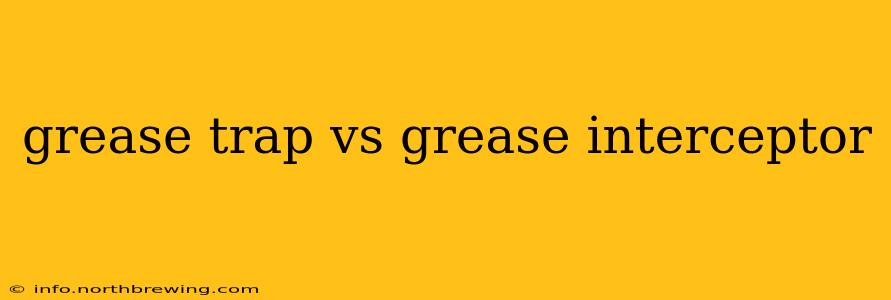Choosing between a grease trap and a grease interceptor can seem confusing, especially since the terms are often used interchangeably. However, there are key differences that impact efficiency, compliance, and overall cost. This guide will clarify the distinctions, helping you make the informed decision best suited for your needs.
What is a Grease Trap?
A grease trap is a simple, relatively inexpensive device designed to separate grease and oil from wastewater. It works on the principle of gravity: wastewater flows into the trap, allowing heavier grease and oil to settle at the bottom while lighter wastewater continues to the drain. Grease traps are typically found in smaller establishments like homes or small restaurants with low grease volume. Their effectiveness depends heavily on regular maintenance, which includes manual cleaning to remove accumulated grease. Failure to maintain regularly can lead to blockages and potentially serious plumbing issues.
What is a Grease Interceptor?
A grease interceptor is a more sophisticated and advanced system compared to a grease trap. It employs a more complex design and utilizes principles beyond simple gravity separation. Grease interceptors often incorporate baffles and other design elements to increase the contact time between wastewater and the interceptor's surfaces, enhancing the separation process. This more efficient separation reduces the amount of grease entering the sewer system. They are commonly required for larger commercial kitchens and food processing facilities that generate significant amounts of grease. They often require less frequent maintenance than grease traps but still need professional servicing to ensure proper functionality.
What are the Key Differences Between a Grease Trap and a Grease Interceptor?
The core distinctions lie in their design, capacity, efficiency, and maintenance requirements:
| Feature | Grease Trap | Grease Interceptor |
|---|---|---|
| Design | Simple, gravity-based | More complex, often includes baffles and other features |
| Capacity | Lower | Higher |
| Efficiency | Lower, relies heavily on regular maintenance | Higher, more effective at grease separation |
| Maintenance | Requires frequent manual cleaning | Requires less frequent, but professional servicing |
| Cost | Lower initial investment | Higher initial investment |
| Regulations | May be sufficient for smaller establishments | Often required for larger commercial kitchens |
How do I know which one I need?
The choice between a grease trap and a grease interceptor depends largely on the volume and type of wastewater generated. Local plumbing codes and regulations play a crucial role in determining the appropriate system. Factors to consider include:
- Volume of Grease: High-volume grease producers need grease interceptors. Low-volume operations might suffice with a grease trap.
- Type of Business: Restaurants, food processing plants, and other similar businesses generally need grease interceptors to meet regulatory standards.
- Local Regulations: Check with your local authorities to understand specific requirements in your area. Failure to comply can lead to hefty fines.
What are the consequences of not using the correct system?
Using an inadequate system can have serious repercussions:
- Sewer Blockages: Grease buildup can clog pipes and drains, causing costly repairs and potential backups.
- Environmental Damage: Grease entering the sewer system can contaminate waterways and harm the environment.
- Fines and Penalties: Non-compliance with local regulations can result in significant fines.
What kind of maintenance is required for each system?
Both systems require regular maintenance, though the frequency and complexity differ:
Grease Trap Maintenance: Requires frequent manual cleaning, possibly weekly or bi-weekly depending on usage. This often involves removing and disposing of accumulated grease.
Grease Interceptor Maintenance: Usually requires less frequent professional servicing, potentially quarterly or semi-annually, depending on usage. Professionals will pump out accumulated grease and inspect the unit's functionality.
In conclusion, understanding the differences between grease traps and grease interceptors is critical for ensuring efficient wastewater management and compliance with local regulations. Choosing the right system is an investment in the longevity of your plumbing and the protection of the environment. Always consult with a qualified plumber and your local authority to determine the most appropriate solution for your specific needs.
